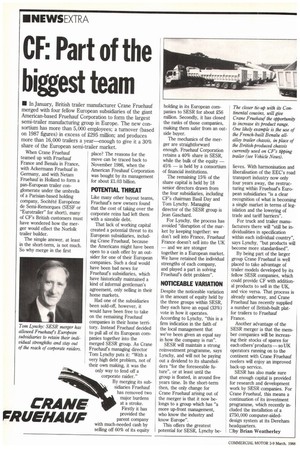POTENTIAL THREAT
Page 26

If you've noticed an error in this article please click here to report it so we can fix it.
Like many other buyout teams, Fruehauf s new owners found that the cost of taking over the corporate reins had left them with a sizeable debt.
That lack of working capital created a potential threat to its European subsidiaries, including Crane Fruehauf, because the Americans might have been open to a cash offer by an outsider for one of their European companies. Such a deal would have been bad news for Fruehauf s subsidiaries, which have historically maintained a kind of informal gentleman's agreement, only selling in their home markets.
Had one of the subsidiaries been sold-off, however, it would have been free to take on the remaining Fruehauf companies in their home territory. Instead Fruehauf decided to pull all of its European companies together into the merged SESR group. As Crane Fruehauf's managing director Tom Lynchy puts it: "With a very high debt problem, not of their own making, it was the only way to fend off a corporate raider."
By merging its subsidiaries Fruehauf has removed two major burdens at a stroke.
Firstly it has provided the parent company with much-needed cash by selling off 60% of its equity holding in its European companies to SESR for about £56 million. Secondly, it has closed the ranks of those companies, making them safer from an outside buyer.
The mechanics of the merger are straightforward enough. Fruehauf Corporation retains a 40% share in SESR, while the bulk of the equity 45% — is held by a consortium of financial institutions.
The remaining 15% of the share capital is held by 18 senior directors drawn from the four subsidiaries, including CF's chairman Basil Day and Tom Lynchy. Managing director of the SESR group is Jean Gaschard.
For Lynchy, the process has avoided "disruption of the market by keeping together: we don't sell into France, Fruehauf France doesn't sell into the UK — and we are stonger together in a European market. We have retained the individual strengths of each company, and played a part in solving Fruehauf's debt problem".
NOTICEABLE VARIATION
Despite the noticeable variation in the amount of equity held by the three groups within SESR, they each have an equal (33%) vote in how it operates. According to Lynchy, "this is a firm indication in the faith of the local management that we've been given an equal say in how the company is run".
SESR will maintain a strong reinvestment programme, says Lynchy, and will not be paying out a dividend to its shareholders "for the foreseeable future", or at least until the group is floated, in around five years time. In the short-term then, the only change for Crane Fruehauf arising out of the merger is that it now belongs to a group which has "a more up-front management, who know the industry and know Europe".
This offers the greatest potential for SESR, Lynchy be The closer tie-up with its Continental cousins, will give Crane Fruehauf the opportunity to increase its product range. One likely example is the use of the French-built Benalu allalloy trailer chassis, in place of the British-produced chassis currently used on CF's tipping trailer (see Vehicle News).
lieves. With harmonisation and liberalisation of the EEC's road transport industry now only four years away, the restructuring within Fruehuafs European subsidiaries "is a clear recognition of what is becoming a single market in terms of legislation and the lowering of trade and tariff bathers".
For truck and trailer manufacturers there will "still be individualities in specification within each individual country", says Lynchy, "but products will become more standardised".
By being part of the larger group Crane Fruehauf is well placed to take advantage of trailer models developed by its fellow SESR companies, which could provide CF with additional products to sell in the UK, and vice versa. That process is already underway, and Crane Fruehauf has recently supplied a number of British-built platfor trailers to Fruehauf France.
Another advantage of the SESR merger is that the member companies will be increasing their stocks of spares for each others' products — so UK operators running on to the continent with Crane Fruehauf reefers will enjoy an improved back-up service.
SESR has also made sure that enough capital is provided for research and development work by SESR companies. For Crane Fruehauf, this means a continuation of its investment programme, which recently included the installation of a £750,000 computer-aideddesign system at its Dereharn headquarters.
Oby Brian Weatherley




























































































